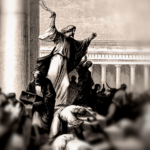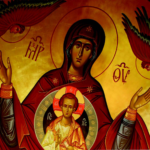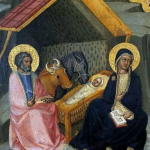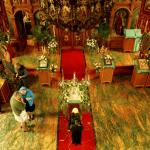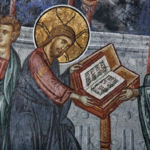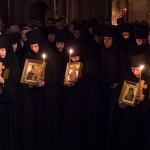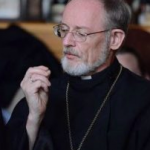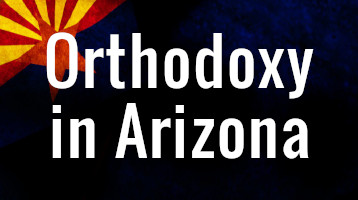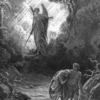by Fr. Patrick Henry Reardon Originally entitled The Holy Eucharist: A Live Coal Speaking of the Holy Eucharist, the Fathers and early liturgical texts of the Church have recourse to the metaphor of the flaming coal (anthrax, pruna) in reference to the Lord’s body. For instance, with Isaiah 6:7 obviously in mind, The Liturgy of St. James refers to “receiving the fiery coal” (labein to pyrinon anthrax) from the Eucharistic altar. Indeed, even without using this word, those same doctrinal sources regularly appeal to Isaiah’s experience, when they speak of the Holy Eucharist. Thus, in The Liturgy of S. John Chrysostom, when the Christian has received the Holy Communion, the priest tells … [Read more...]
Cleansing the Court of the Gentiles
by Fr. Patrick Henry Reardon At the beginning of Holy Week, just after the celebration of Palm Sunday, the Church turns her attention to Jesus’ act of purging of the Temple. As our guiding text here we may take Zechariah 14:20-21, the closing verses of that book: “The vessels in the Lord’s house shall be like the bowls before the altar. Indeed, every vessel in Jerusalem and Judah shall be holiness to the Lord of hosts. Everyone who sacrifices shall come and take them and cook in them. In that day there shall no longer be a tradesman in the house of the Lord of hosts.” In fulfillment of this prophecy, Mark records that Jesus, when he cleansed the Temple, “would not allow anyone … [Read more...]
What Shall We Offer to the Virgin?
by St. Photios the Great Such things the archangel was saying, drawing the spotless maiden to assent. But to this what was the reply of the honored virgin, the heavenly chamber, the holy mountain, the sealed fountain, kept for Him only who had sealed it? “Since,” says she, “thou hast clearly explained that the Holy Ghost shall come upon me, I no longer demur, I no longer object. Be it unto me according to thy word (Lk. 1.38). If I am judged worthy for the Lord, I will gladly serve His will. If the Builder desires the thing built to become a temple to the Builder, let Him construct a house unto Himself as He has pleased. If the Creator rests on His creature, let Him mold in me His … [Read more...]
The Acquisition of Humility
by Fr. Patrick Henry Reardon Among the imperatives of the Christian moral life, I wonder if any is the occasion of more bewilderment than the call to be humble. This impression arises not only from my own experience of the problem but also from the many times other Christians have asked me, “How can I learn humility?” If humility were simply one of the moral virtues—as it is often treated—its acquisition would be rather simple, I think. A person would first define humility, as an ideal, and then bring his conduct, as far as possible, into conformity with that ideal. This is, after all, the way someone attains other moral virtues, such as justice and prudence. We have always known, … [Read more...]
The Ass and The Ox in The Nativity Icon
By Jonathan Pageau There is no ass or ox in the Biblical narratives of the birth of Christ. Yet, besides the Christ Child himself, the ass and the ox are the most ancient and stable elements in the iconography of the nativity. In fact the earliest example of a nativity known to us contains only the swaddled Christ in the manger flanked by the ox at his head and the ass at his feet. David Clayton, on the New Liturgical Movement blog, has written a detailed piece on the subject, and I will go through the basics while adding a few more aspects he does not mention. When reading comments on the nativity (for example in Ouspensky’s “The Meaning of Icons”) one finds that the inclusion of this … [Read more...]
From Pascha to Pentecost
By Protopresbyter Dr. George D. Dragas 1. The Pentecostal Period. The word, Pentecost means “the fiftieth” and is used to designate the great event of the Outpouring of the Holy Spirit (Epiphoitesis) upon the Apostles and the Church on the 50th day after the Resurrection of Christ, just ten days after His Ascension into Heaven. Before His Passion, the Lord spoke to his Disciples about the gift of the Holy Spirit, which they were to receive after the Ascension. The details are preserved in the Gospel of Saint John: “I will ask the Father to send you the Holy Spirit who will defend you and always be with you” (14:16). He also said, “The Holy Spirit can not come to defend you until I … [Read more...]
On the Midfeast of Pentecost
by Fr. Seraphim Rose Lay Sermon by Eugene Rose (future Hieromonk Seraphim), May 1965 For too many of us, perhaps, the weeks following the radiant Feast of the Resurrection of our Lord Jesus Christ are a time of relaxation and even of indulgence; the rigors of the Fast being ended, the body revels while the spirit grows weak. But if this is unfortunately so, it is our own fault and not the fault of the Holy Church; for she never ceases to draw our minds upward and instruct us as to what thoughts and actions are appropriate for Orthodox Christians in this holy season. Each Sunday after Easter has a special name drawn from the appointed Gospel reading; between Easter and the Ascension there … [Read more...]
Fifty Days of Sundays
by Fr. Patrick Henry Reardon When, at the Council of Nicaea, the Church formally determined that Pascha should always be observed on a Sunday, that determination necesarily affected the final day of Pentecost. Thus, beginning and ending on a Sunday, the whole fifty days of Pentecost began to take on some of characteristics associated with Sunday, the day of the Lord’s Resurrection. This adjustment involved two disciplines in particular: the fast days and the posture of prayer. First, because the entire fifty days of the Paschal season was a celebration of the Lord’s Resurrection, Christians began to observe that interval as a non-fasting period. That is to say, from the fourth century on, … [Read more...]
How Monastics Acquire Their New Names?
Ever wonder why and how monastics receive a new name? What are the criteria for choosing names given to monks and priests? Can they influence the choice of their future names in one way or another? During this Great Lent many monastic novices became nuns, they took the monastic vows. It happened on April 15th. Several sisters took the Rassaphore and Stavrophore vows in our Convent. They were tonsured by the Most Reverend Veniamin, Metropolitan of Minsk and Zaslavl. The good tradition to perform tonsures during the Lenten season is not accidental: it’s the time when all services and prayers are designed to help us reconsider and improve our fallen way of living. We have heard the Gospel … [Read more...]
The Moral Peril of Taking Most Covid-19 “Vaccines”
by Fr. Alexander F. C. Webster, PhD The recent public statement by the Orthodox Theological Society in America (OTSA) released on March 8, 2021, with this unwieldy title—“Covid-19 vaccines: How they are made and how they work to prime the immune system to fight SARS-CoV2”—offers a seeming patina of legitimacy to an ethical argument that is abhorrent to any informed, devout Orthodox Christian. (See https://www.otsamerica.net/wp-content/uploads/2021/03/Covid19-VaccineTech.pdf.) In this essay, I shall retrieve that gauntlet and offer what I hope is a compelling counterargument. I. The OTSA statement declares boldly, “Most Church leaders have agreed that the many lives saved by … [Read more...]
- « Previous Page
- 1
- …
- 4
- 5
- 6
- 7
- 8
- …
- 10
- Next Page »

